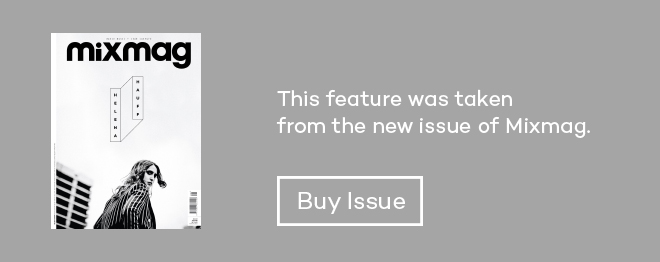 Cover stars
Cover stars
Helena Hauff is everything thrilling about dance music right now
An interview with the remarkable DJ talent in the wake of outstanding new album ‘Qualm’
It’s Friday evening and the sun is sinking below the horizon as Helena Hauff takes the reins for her headline set at Belfast’s AVA Festival. There’s a sense of magic that hangs in the air at twilight. Often it’s a cue for DJs to draw for blissed-out cuts of Balearica and house, but Hauff’s sunset selections are dominated by unruly acid and electro. A hangar-style roof held up by steel pillars casts an imposing shadow over the open-air dancefloor as inky purple and yellow spotlights struggle to cut through the smoke machines billowing overhead. The dancers assembled have come looking for darkness.
“I read somewhere that some people – ah, what’s that fucking thing called?” Helena Hauff pauses in frustration. “Coriander! I read that for some people it tastes like soap, whereas for others it just tastes like coriander. Apparently it’s a genetic thing. Sometimes I think about music the same way. Why do people think what sounds good to me will sound good to everybody else? Maybe for some people it sounds like soap.”
To Helena Hauff’s ears, mixing soaring electronica at sunset sounds like ‘soap’. A flurry of rough-edged bangers, on the other hand, is more to her taste. Her style is not for the faint-hearted, but for those with a palate favouring raw and incendiary sounds there’s no better artist in the world right now. The Hamburg native picked up her first international booking in 2012 and since then has soared up the ranks to headliner status at the finest clubs and festivals there are, her mixing skill immortalised via YouTube uploads of her appearances at Into The Valley, Dekmantel’s Boiler Room stage, and more. Along the way she’s been uncompromising in her commitment to the searing end of the musical spectrum, impeccably demonstrated in her 2017 BBC Radio 1 Essential Mix, crowned by Radio 1 staff as the Essential Mix of the year. “It’s what I love,” she says matter-of-factly. “That’s my taste in music. I’m just going to play what I like, and then maybe you’ll like it too – that’s cool.” Helena Hauff has always blazed her own trail, immune to musical trends. By doing so she has become a phenomenon in her own right.
The queue of people hoping to squeeze onto the already packed dancefloor during her set at AVA is indicative of her popularity. She’s closing The Loading Bay stage at S13, the former B&Q warehouse-turned-venue hosting the festival. The dancefloor is a concrete delivery ramp at the rear of building, initially built as a passage for heavy industrial vehicles. It trembles under the pressure of dancing feet and vibrations powering from the speaker stacks as Hauff – dressed in heels, a geometric print skirt, blood red tights and a deep blue shirt – pushes the capacity crowd into overdrive across 90 blistering minutes. “UK crowds are so rowdy,” she says with a grin. “I like that a lot.”
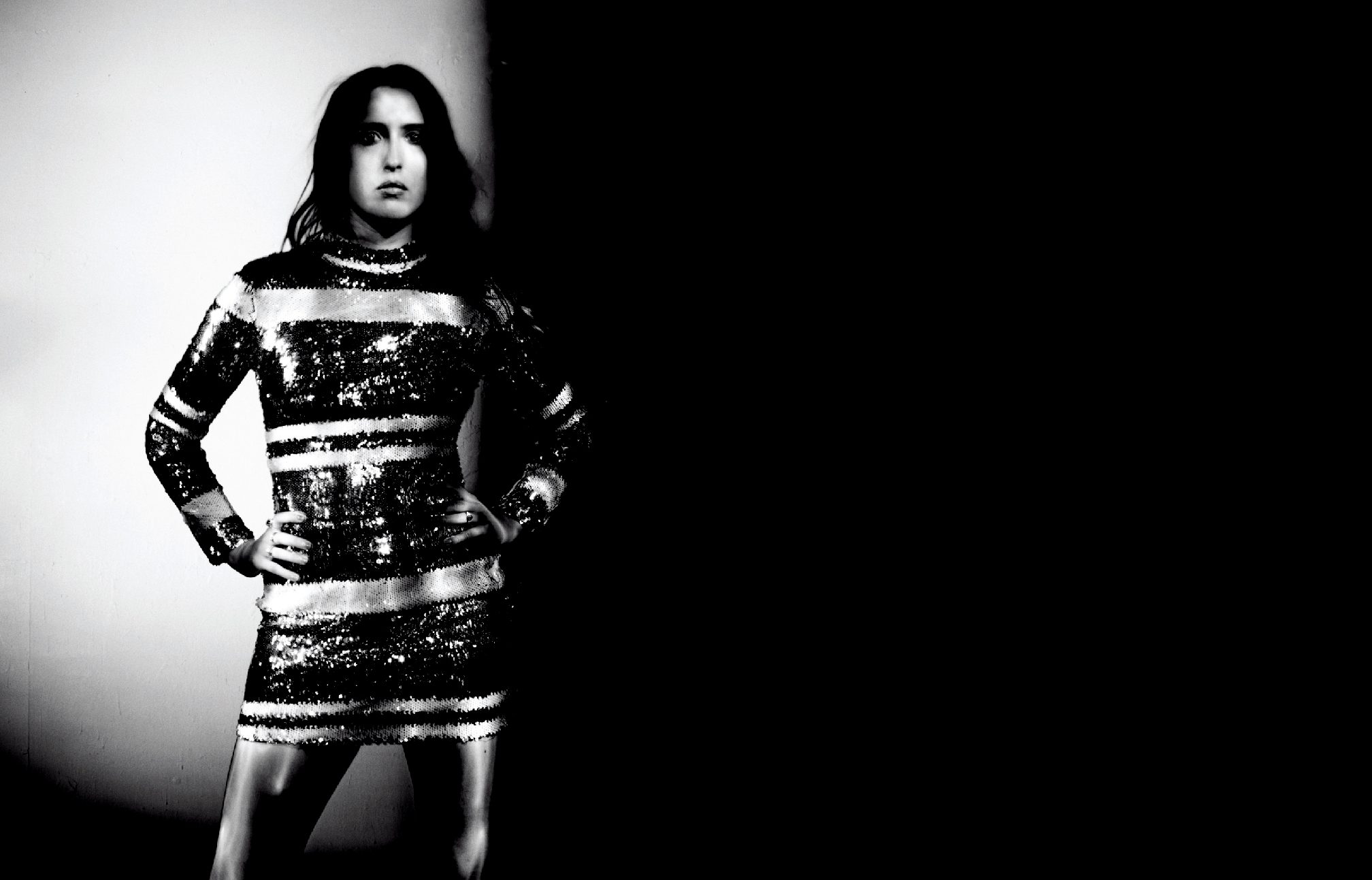
Several years ago Hauff expressed concerns about reaching the level of popularity she’s currently at, worried it would stop her playing the intimate sweatbox parties she loves. But now that seemingly improbable future is reality, she’s characteristically relaxed, taking it all in her stride. “I changed my mind!” she laughs. “I love it.” Her mood reflects the fact that, really, not much has changed. “I don’t really care how famous I am. I never try to become more popular, I always just did my thing and then it happened,” she says. “I didn’t even really notice the change so much; it was fairly gradual. I just started playing more and more, and the clubs and festival stages were getting slightly bigger. I still do a lot of the same clubs and shows, it’s just that my name is a little bit higher on the flyer, or a little bit bigger than it was before.” The spread of audiences she plays to remains broad, and her approach doesn’t change from weirdo holiday park weekenders at Pontins like Bangface to headlining Sónar. “Bangface was actually one of the things that I always wanted to do – that’s my kind of vibe! I spent most of my time in the arcade getting rid of change, totally pissed,” she says. Big and bold on the flyer, Helena Hauff is still just being Helena Hauff.
And her sets remain relentlessly challenging and surprising. A strain of criticism has been directed at some corners of the European techno circuit in recent years for a perceived white-washing of the sound, but such comments could never be applied to Helena Hauff. She stands out from the crowd through the diversity and raucousness of her record bag and the unrivalled dynamism with which she plays her collection. “There are so many different types of electro and I try to combine them all. It’s the same for techno,” she says of her approach of mixing up transatlantic styles spanning early Detroit cuts to “the playful Swedish stuff, more acidic Dutch stuff” to “something a bit more EBM-ish sounding” and everything in between. “There’s one thing I don’t like, and that’s the straight techno with just a hi-hat on the offbeat and not much else going on. If I was only playing that kind of stuff I would get really tired and bored.”
Hauff is an admirer of Detroit electro pioneers Drexciya, and at Dekmantel 2016 had the rare opportunity to play back-to-back with their former tour DJ Sherard Ingram aka DJ Stingray. It’s a set Mixmag remembers fondly as a pneumatic deluge of 140+ BPM screwface sounds. Surely a career highlight in anyone’s book? “It was terrible!” exclaims Hauff with a laugh and a shrug. “We had loads of trouble with the turntables. It was a nightmare.” While Hauff labels herself as a messy and chaotic person, that only applies to her home life. When it comes to working and touring she needs everything to be perfect. “I’m really good with flights. I’m always on time, I don’t tend to forget things,” she says. “When I’m touring I’m absolutely fine, then when I come back home I’m like, oh my god, what am I going to do?”
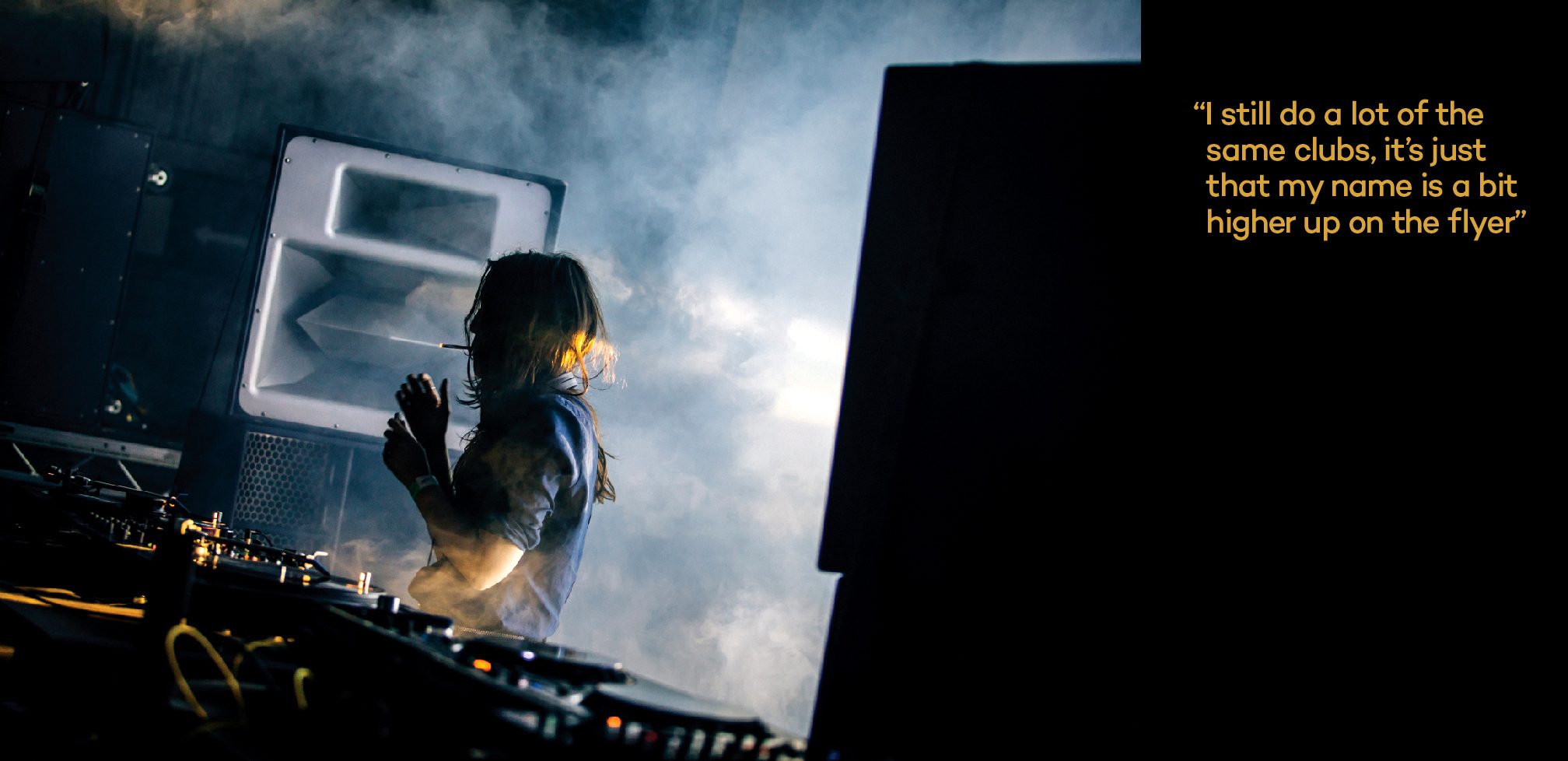
Largely due to her explosive style, she generally prefers shorter sets to Berlin-style marathon sessions. “Sometimes there’s a little bit of a climax and sense of united energy missing, and everything becomes a bit of a blur,” Hauff says. Another reason is she only plays vinyl and in instances where the equipment is messing up she’s miserable. “It can be a bit painful if you’re stuck up there for eight hours and there’s technical issues. It’s horrible.” The gig with DJ Stingray was frustrating due to the technicals, but she was no more disappointed that it didn’t go to plan than any other show. “We might do something together again in the future, but we’re both not the greatest fans of back-to-back sets. In a lot of cases I think people are actually better on their own because they tend to play very safe when they play back-to-back. You don’t want to ruin it for the other person so you don’t necessarily play a track that’s really difficult to mix. Or it goes the opposite way and it gets really chaotic, which is good in small club situations but on big festival stages it doesn’t really work.”
Hauff expresses herself best when she’s in total control. In the eye of the storm of her flawless AVA set, the needle skates along a temporarily beatless section of ‘Shadow Deception’ by hardcore rave pioneer The Mover. Even without percussion, the track is gripping and fraught, with low-pitched synth notes rumbling through the foundation and sharper tones palpitating overhead. But in a Helena Hauff set, it’s a moment of relative calm. The dancefloor is suddenly distinguishable as a collection of individuals, as faces flushed with excitement take the opportunity to sing out their appreciation in loud whoops and whistles. Hauff is a picture of cool at the helm of the party, retrieving a pint from the floor and taking a swig. Seconds later she’s back in the zone behind the two turntables and mixer, facing forward with her feet apart in a stance that resembles Cristiano Ronaldo poised before unleashing a dead ball thunderbolt. Momentous breakbeats slam back into the mix and the crowd reverts to a singular mass of unbridled movement. And now, Hauff is with them. She whips her head back and throws her arms into the air, twisting them in gracefully angular patterns, as though she’s a puppet master pulling strings attached to the heaving throng below.
Hauff was a high achiever at school, ranked among the top 10 students in Hamburg in her final year, but her interest in education flatlined after moving onto university. She started a fine art degree, then switched to physics and systematic music science before dropping out completely. Around the same time she first encountered dance music and DJing at a warehouse party, and quickly became fixated. “I was absolutely obsessed with it. I would stand behind the decks for hours every day and I couldn’t stop because I loved it so much. Mixing records into each other, seeing how things fit together,” she says. “There wasn’t much time for studying physics.” She became a regular attendee at Hamburg sweatbox club Golden Pudel, later taking up jobs behind the bar and in the booth, launching her Birds And Other Instruments residency in 2010 after regularly pestering the owners to let her play. Eight years down the line and every party on the planet is lining up to book her.
It’s clear from the way Hauff talks about touring that she hasn’t lost a grain of passion for her craft in that time. There are no complaints about sleep deprivation or flight delays; in fact, she seems to enjoy the emptiness of the time. “I like to just sit around, look at people who walk by and stuff. It’s nice!” she says. “I play a lot of Snake on my phone,” she adds, whipping out a brick Nokia that looks like it can store about 10 texts and a handful more numbers, showing off her high score (which has surpassed 3,000).
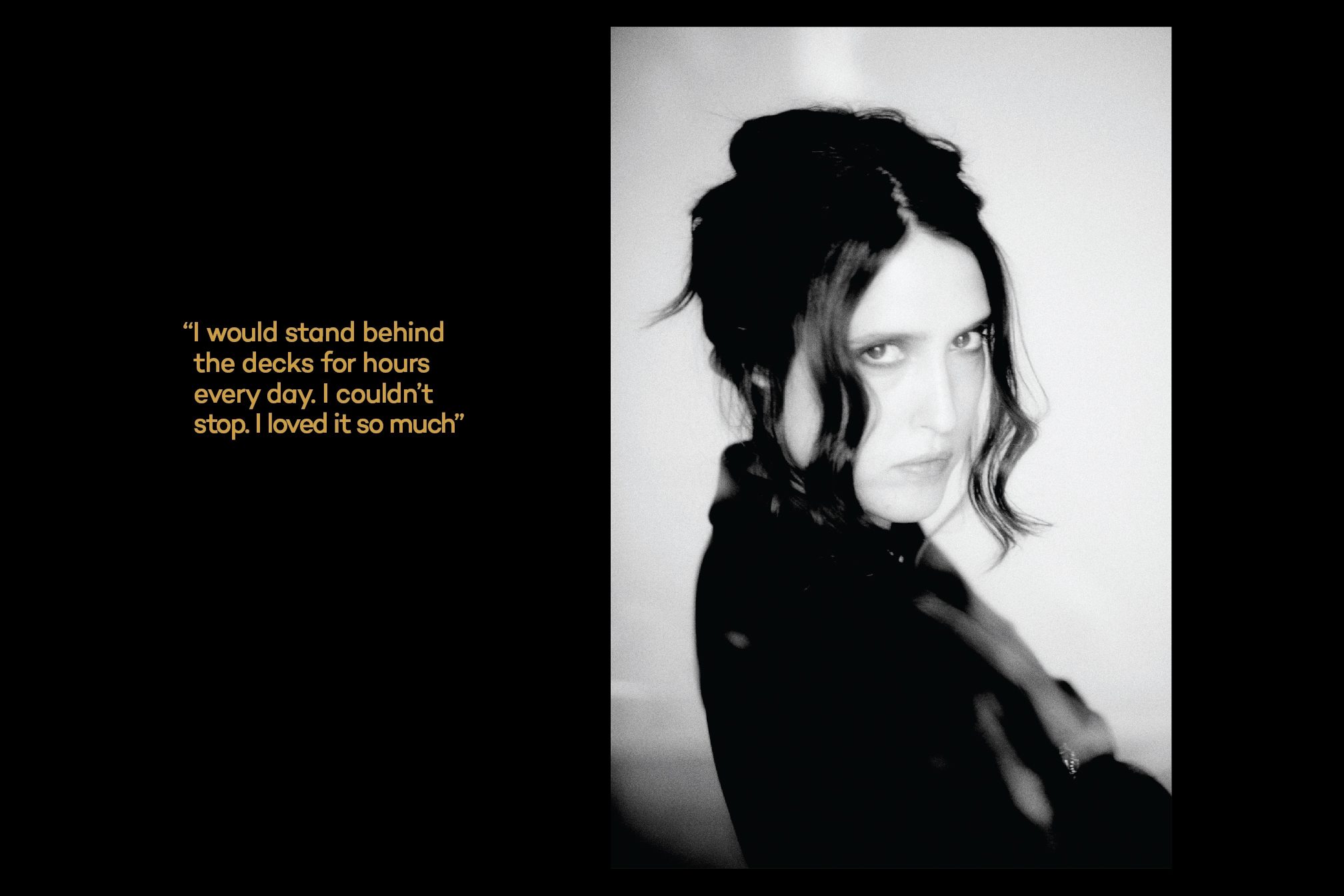
We’re in a car skimming through North East London en route to Stansted Airport 10 days after AVA. The photoshoot for the cover ran into our planned interview time, and as usual, Hauff has a flight to catch, so we’ve joined her in her taxi for a backseat interview. It’s a scenario disarmingly similar to the final moments of an episode of The Apprentice, where a departing contestant angrily hits out against their dismissal, but Hauff is typically unfazed. “It’s kind of relaxing,” she says of her first interview in transit. Her complexion looks pale against her dark hair and eye make-up, but her face always is vivid and expressive. She breaks into laughter as she answers questions in pithy one-word phrases, before furrowing her brow inquisitively as she ponders the point more deeply. You get the impression Hauff’s mind is always half tuned into the next time she’ll be stepping into a booth. The last time she took a weekend off was the start of January. “I might go on holiday in November, or next January,” she ponders momentarily, before her mind is back to its usual track. “I need to pack my bag for Sónar. I haven’t really had a chance to repack my record bag since I got back from the States. It’s a bit annoying, I want to play new stuff.” It’s as though her life happens in inverse. On the road she’s focused, comfortable and in control, while time spent at home is disorderly and unsettled. “My flat is a mess,” she says, and describes “sitting in front of the computer replying to shitloads of bloody emails” with a disgusted sigh. “Oh god, I hate emails!” One calming influence has been her semi-adoption of a neighbour’s cat that visits every day. “I can stroke it and it loves being fussed. It lies on its back and I just cuddle it for the whole afternoon. It’s so cute!”
A sense of duality permeates Hauff’s music. “I really wanted to make something quite rough,” she says of her new album ‘Qualm’, which is packed full of scuzzy, head-spinning and fizzing analogue sounds. “I’m always interested in creating something strong and powerful from not too many elements. Minimal, in a way. I mean it’s not minimal music, it’s more like maximum music, full on. But it’s a minimal approach.” ‘Qualm’ is a word which features in both the English and German vocabulary. “I like words that have different meanings. I think it’s very interesting to use those words for song titles or album titles because it leaves things a little bit open,” she says. The Oxford English Dictionary defines it as ‘an uneasy feeling of doubt, worry, or fear, especially about one’s own conduct’. The German word, pronounced ‘kvalm’, translates as ‘fumes’ or smoke’. Hauff is a habitual smoker, and one of the fastest rollers of a cigarette we’ve ever seen. She once unsuccessfully attempted to strike a deal with tobacco company Reemstma to give away cartons of cigarettes with a release on her impeccably curated label Return To Disorder; outlet for sought-after EBM collectibles that fetch high prices on Discogs. “That would have been funny,” she says. “I don’t want to promote cigarettes, though, they are terribly bad for you.” Somehow cigarettes feel like an appropriate partner to Hauff’s music. Raw, transient moments of burning intensity. Detestable and dirty to some, an intoxicating headrush to others. And those who enjoy the sensation can’t get enough.
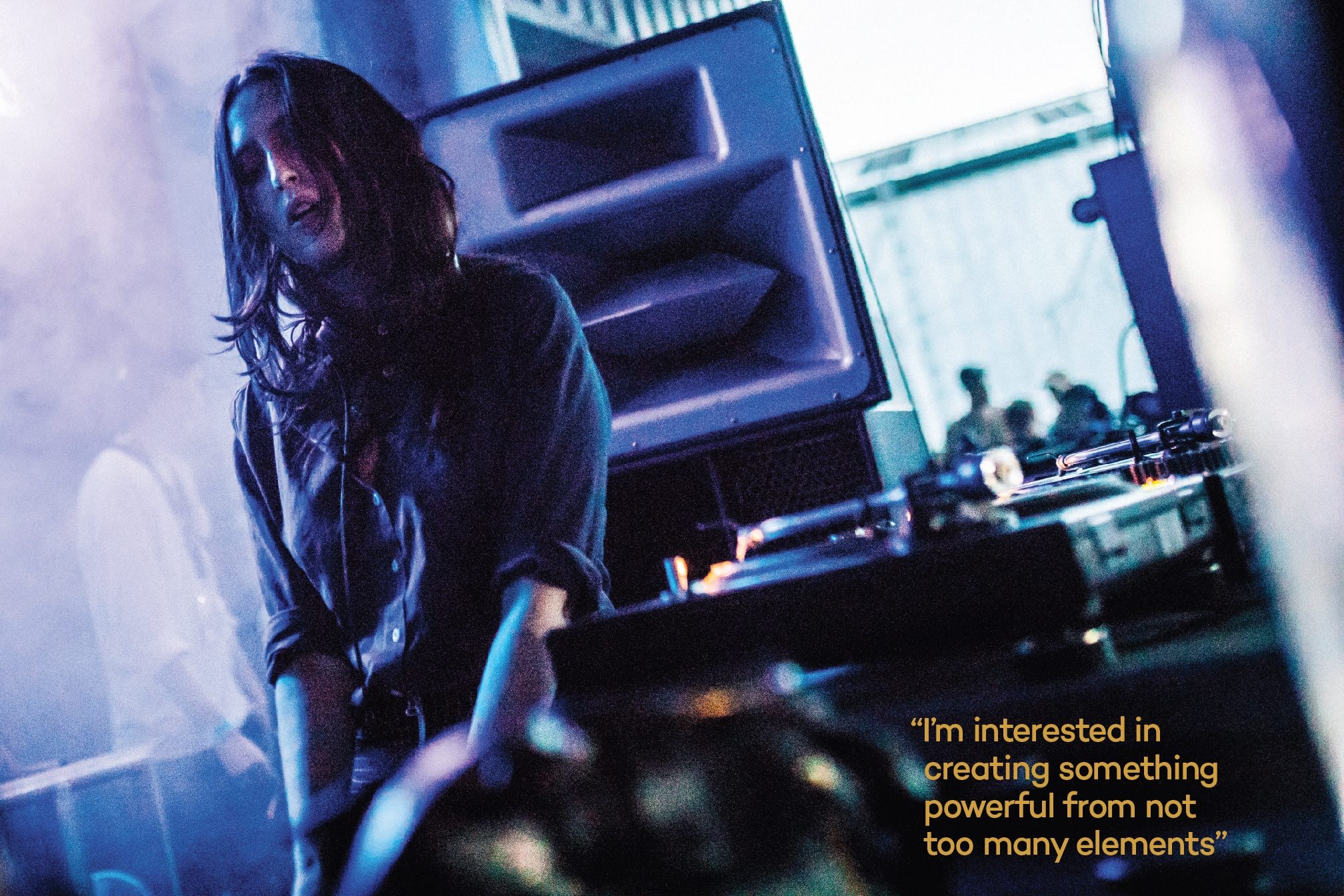
Hauff is an appreciator of the transience of life. “I rarely get my sets recorded because I want it to be that moment, then I want it to be gone,” she says. “I just want to share this moment with the people that were there – what happens in the club should stay in the club, you know?” She never takes photos on her worldly travels, and is not on social media, preferring real life interactions. “Maybe I should do an experiment, because I’m almost like this weird, rare species that’s never touched it. Get a doctor and see if my brain developed differently or something,” she says. “There’s a study that found you can only have so many friends or only remember so many faces: there’s a limit. I think I’ve reached mine already,” she adds, speaking from the Drake and DJ Khaled school of ‘No New Friends’. She consumes plenty of non-social media, though, such as newspapers and magazines, and keeps abreast of the ever-changing discourse dominating dance music at any given time. “I do know what’s going on – unfortunately.” Considering all the flak social media is now taking for its lack of regulation being exploited by troubling political campaigners and damaging impact upon mental health, Mixmag suggests Hauff may be ahead of the curve in staying permanently logged off, but she’s unconvinced. “Everybody knows [social media] steals your information and it’s not good for your psychological health and all that kind of stuff. And people still don’t leave!” The necessity of work emails means she begrudgingly has to get involved in some form of digital communication, but when she sends them she changes the colour of every letter individually, fighting back against the sterility she perceives in the online world with technicolour texts. “Do you know how much time I spend on those emails? It’s stupid,” she says. “It looks good, though. The thing is, I never do things halfway, I always do them properly. But my properly might look a bit weird.”
All out of prepared questions and stuck in traffic outside Stansted, we slip into more casual conversation. Read any good books lately? “I just bought a book about death,” replies Hauff. “Death is just perfect, it’s brilliant. You could not have invented death any better. Everything else probably could be better, you know, but death is just like bang, death, nothing there.” We’re back on the topic of transience, which feels like the crux of what makes Helena Hauff so vital. Wherever she is and whoever she’s playing to, the present moment holds her absolute focus, and she never fails to bring her A-game. In Helena Hauff’s words, life can never be perfect. But when she’s at the decks and you’re on the dancefloor, it feels close.
‘Qualm’ by Helena Hauff is out on Ninja Tune on August 3
Fan of the album? Keep up to date with Helena Hauff with Mixmag's artist page
Patrick Hinton is Mixmag's Digital Staff Writer, follow him on Twitter

